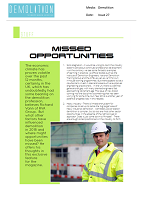 In issue 27 of Demolition, our managing director Richard Vann provides his thoughts in an exclusive feature on the missed opportunities within and around the demolition industry.
In issue 27 of Demolition, our managing director Richard Vann provides his thoughts in an exclusive feature on the missed opportunities within and around the demolition industry.
Blog
How to make your demolition team more resilient in 2019
At the end of last year, RVA’s managing director Richard Vann spoke to the editor of Demolition News about the topic of demolition team resilience, especially during turbulent economic times. If you missed the write up, you can catch up in full here…
Resilience is an increasingly referenced term in the business environment, but as is often the case with overused words and phrases, its meaning has become somewhat lost on many.
So, before the secret to resilience can be considered, it is firstly crucial to know what it really stands for.
Defined as the ability to withstand or recover quickly from difficult conditions, resilience may have recently come to the fore given the constant ebb and flow of the economic climate. But irrespective of the internal or external factors imposed on demolition firms, resilience is something that successful businesses have always had to demonstrate.
It’s easy to look back on our memories of ‘the good times’, and – as a profession – we are quite a reflective bunch. I’ve lost count of the number of times I’ve heard recollections of ‘It’s not as good as it used to be’ or ‘You could really make money back in the day’. But in the absence of a time machine there’s not much we can do about the ‘glory days’ of years gone by. Also, whilst perhaps a slightly cynical viewpoint, I would suggest that over any period of say, 10 years, there will have been good – and not so good – moments.
Demolition businesses have always had to evolve and adapt to succeed. The crux of the matter, however, is that in recent times the pace of the need to change, has probably happened more furiously than at any point in the 50 years’ previous.
The justifiable promotion of HSE excellence to the top of the priority list, clients’ heightened expectations, an increasingly complex legal framework, the cost of funding and managing the continuity of a business, and the change in geographical market locations, are just some of the factors at play.
Yet these factors will change again in the next 12 months, and beyond. They will probably become even more challenging. To mitigate the situation, a ‘survival plan’ must therefore be implemented.
Demolition has long looked at itself as a ‘special case’ – the ‘Cinderella of the civil engineering sector’. And perhaps it was. But to thrive and grow, it must jettison the self-flagellation persona and accept it is an industrial service just like any other. It is responsible for its own success or lack of it. And here is where the resilience begins.
As individual organisations we must focus on the basic principles of any free market entity that aims to progress and be successful – we need to deliver the right product, to the right market, at the right standards and right price, at the right time. Technical skillsets are, without question, key assets for any demolition company, but those alone – in the absence of professional business management, service development, training and investment – are unlikely to break the pattern or create resilient organisations. A mindset shift is of paramount importance.
Companies that have already adapted their mentality from small family-run enterprises to robustly-managed corporations, are reaping the rewards. But a long road still lies ahead for the majority.
Demolition News – Demolition Resilience
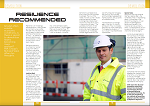 In the 2019 Demolition Directory, our Managing Director Richard Vann shares his thoughts and advice on how demolition businesses need to adapt and evolve in order to succeed.
In the 2019 Demolition Directory, our Managing Director Richard Vann shares his thoughts and advice on how demolition businesses need to adapt and evolve in order to succeed.
Nuclear Engineering International – Drawing On Outside Expertise
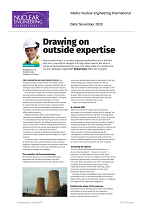 In November’s edition of Nuclear Engineering International, Richard Vann offers his thoughts on the challenges you may face decommissioning the non-controlled area of a nuclear site.
In November’s edition of Nuclear Engineering International, Richard Vann offers his thoughts on the challenges you may face decommissioning the non-controlled area of a nuclear site.
Demolition and Recycling International – New Leadership
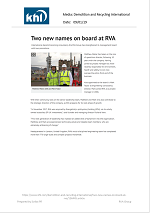 Industry headlines share the news of RVA’s strengthened management team, with two promotions.
Industry headlines share the news of RVA’s strengthened management team, with two promotions.
New leadership team for decommissioning specialist
Decommissioning consultancy RVA Group has strengthened its management board with two employee promotions and the appointment of four additional members of staff.
Long-standing colleague Matthew Waller has taken on the role of operations director, following 10 years with the company. Having joined as project manager but more recently responsible for group EHS (environmental, health and safety) excellence – as well as the delivery of engineering projects worldwide – he will now oversee the entire front end of the business.
Also appointed to the board is Mark Taylor as engineering consultancy director – an extensively qualified civil engineer responsible for the management and quality control of RVA’s global consultancy projects. He joined RVA as a project manager back in 2006.
With their continuing roles on the senior leadership team, Matthew and Mark will also contribute to the strategic direction of the company, as RVA prepares for its next phase of growth.
Commenting on the organisational restructure, founder and managing director Richard Vann explained: “In November 2017, RVA was acquired by Energetický a průmyslový holding (EPH), via its wholly owned subsidiary EP UK Investments Ltd. The news came in the month that we celebrated 25 years in business, and it marked the latest chapter in preparing a company fit for the future.
“This next generation of leadership has injected an added level of dynamism into the organisation. Matthew and Mark are experienced, technically astute and likeable team members, who are extremely embracing of change – all are important qualities as we head into our next quarter of a century.”
The promotions coincide with the appointment of three other highly-qualified engineering professionals.
Adam O’Neill is a commercially aware project manager who has spent his career working in the power generation, nuclear, construction and building services. He is joined by fellow project managers Carl Fawkes, with a background in subsea engineering and decommissioning; and Chris Donnelly who has eight years’ demolition project management experience.
With further roles potentially on the horizon, Richard elaborated “We invest continuously in the development of our people, because such ongoing learning is crucial in our inherently high-hazard world. But the welcoming of ‘new blood’ – to complement our existing talent – is also important.
“It means we’re now well equipped to tackle even more UK and international projects in 2019 and beyond.”
Headquartered in London – and with experience working in the global chemical, petrochemical, pharmaceutical, power, energy, oil, gas and heavy manufacturing industries – RVA’s multi-disciplined engineering team has completed more than 770 large-scale and complex projects worldwide. Other members of the management board include Ian Wharton who takes on the responsibility of strategic development director, and business manager Lilia Russell.
5 missed opportunities for demolition in 2018?
The economic climate has proven volatile over the past 12 months, certainly in the UK, which has undoubtedly had some bearing on the demolition profession. But what other factors have influenced demolition in 2018 and where might opportunities have been missed? Here are some thoughts from the RVA team…
- Skills stagnation?
It would be wrong to claim the industry doesn’t care about continued professional development – on the contrary we see some fantastic examples of learning in practice, via official bodies such as the National Demolition Training Group and the CITB, as well as via firms’ own in-house training programmes. But there appears to be an apparent reluctance to invest in specialist areas such as explosives engineering practitioners.
In the UK, there is a definite generational gap, with many talented engineers fast approaching retirement age. The issue of new blood coming into the discipline is something that has been worrying witnessed for some time, but I fear 2018 is another year of potential progress lost, in this respect.
- Heavy industry
There is limited enthusiasm for companies to set up to tackle the ‘big target’ area of heavy industrial demolition. Admittedly power station demolition is complex, but so too are most other sector opportunities, in the absence of the right skill-set or approach. Does it just come down to mindset? There are enough skilled practitioners in the industry, to form collaborative, expertise-rich teams that can tackle these types of large, high-hazard jobs safely and effectively. A few contractors are experiencing success by entering this sector but there is still room for more to compete in what promises to be a rich pool of potential, longer-term.
- EU borders
The EU remains the logical place for forward-looking UK contractors to focus their sights. Whilst home-spun opportunities are still arising, working in Europe should be high on the agenda for those who are forecasting 10+ years ahead, even if considering only factors such as the size of the market and the variety of industry-wide assets reaching their end of life.
Naturally there could perhaps be an argument for sitting on the fence until Barnier and May finally reach a Brexit agreement but is this just an excuse? Opportunities in the industrial heartlands of the EU have been open for many years and yet the signs of an influx of interest from UK firms have never been apparent. The work exists and it will be done by someone.
- A reluctance to share?
The exchange of information – whether it be the sharing of best practice or learnings from a non-conforming/failed event – still seems to be a mechanism that the demolition world shies away from. There may be those who don’t view this practice as important, and of course there will be scenarios where confidentiality or commercial sensitivity would preclude release of the fine details of an uncontrolled collapse or a loss of containment, for instance. But it is only by exchange of experiences, that the industry can learn and improve. Most civil engineering disciplines share both good and bad – demolition’s fear of disclosure needs to be overcome.
- A reluctance to champion
Ours is an industry that never appears to champion its own, and I don’t think this is due to a sense of bashfulness. Rather than applauding peers for their innovative methodology, the completion of a successful contract or even the winning of tender, many are quick to claim that it must have been ‘lucky / unfair / they can’t make money at that price’. Perhaps a more supportive and mature culture could be something to work towards over the next 12 months?
The Construction Index – Sardinia
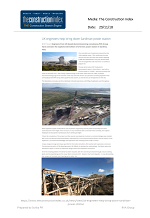
News of RVA Group’s explosives demolition project at a power station in Sardinia, hit the headlines in The Construction Index.
Safety Management – Oil And Gas Decommissioning
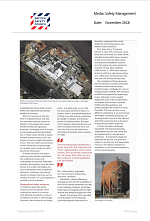
In the latest issue of Safety Management magazine, managing director of RVA Richard Vann explores some of the key complexities in oil and gas decommissioning.
IOSH Magazine – RVA Case Study
 In October’s edition of IOSH Magazine, RVA’s managing director Richard Vann provides his insight into the five key elements to a successful demolition project.
In October’s edition of IOSH Magazine, RVA’s managing director Richard Vann provides his insight into the five key elements to a successful demolition project.








